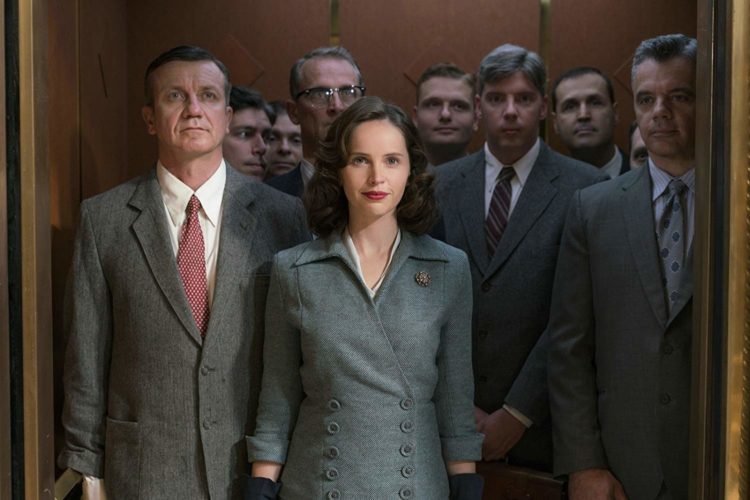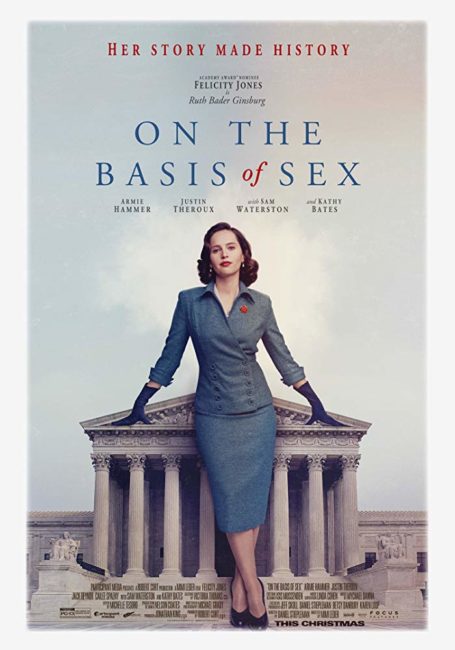If you’re looking for a hard-hitting, data-driven, infancy-through-current-day chronicle covering the life of one of the United States’ most popular judges, you’ve come to the wrong place. Or have you come for an affable girl-power memoir? Then, you’ve also made a wrong turn. But are you down to watch a thoughtfully acted, beautifully depicted portrait of Ruth Bader Ginsburg and the people surrounding her during the early and middle years of her career in law and education? Then welcome.
On the Basis of Sex covers Supreme Court Associate Justice Ruth Bader Ginsburg’s life from law school through the first several years of her career. This period marks the onset of her decades-long (and arguably ongoing) fight for civil rights and the advancement of gender equality.
It is easy to imagine that it is no easy feat to portray a living legacy—an intellectual powerhouse in a delicate 5 foot 1 inch package, nonetheless. Affectionately called “Kiki” by her family and close friends, and dubbed the “Notorious RBG” in today’s American popular culture, RBG must be portrayed by someone who can embody an odd mix of commanding strength, biting wit, familial warmth, and raw tenacity. And somehow Felicity Jones does all of that. Jones gets it right and Bader Ginsburg’s dynamic, self-assured swagger shines on the big screen. (Credit goes to costume designer Isis Mussenden for getting the look and feel right, too: Jones’ on-point outfits and recurring low ponytails tied with RBG’s signature chiffon scarves really hit the mark.) Did On the Basis of Sex evoke the most powerful emotions stirring in the deepest realms of my belly? No. But did it tug at my tender heartstrings? Of course. And did it also make me want to abandon my current career and race to law school? Yes! This is feminist inspiration at its finest. (What I’m saying is I cried—a lot.)
Unfortunately for writer Daniel Stiepleman and director Mimi Leder, release-date-wise, On the Basis of Sex follows another extraordinary portrayal of Ruth Bader Ginsburg—a CNN documentary released earlier in 2018. Viewers who saw the documentary continue to be unfair in their comparison of the two, when really, they should be viewed as companion films. The thing about movies entrenched in politics is that, so often, viewers are unable to suspend their current political leanings and/or beliefs in order to simply enjoy a two-hour cinematic event. On the Basis of Sex is lighter in theme—and in timeline—than the aforementioned documentary as it aims to appeal to the mass audience.
As the film begins, we’re thrust onto the lush green campus and into the Caucasian-male-filled hallways of Harvard Law School. The year is 1956—only six years after Harvard Law began admitting females into its programs. As one of just nine women who attended that year (in a student body comprising about 500 men), Bader Ginsburg (Felicity Jones) starkly stands out in her bright blue dress among a sea of brown and navy suits. A terrific, albeit brief, education in the history and political climate at elite educational systems such as Harvard Law School in the late 1950s, we as viewers are immediately reminded how difficult it was for a woman to receive a higher education at that time. “What does it mean to be a Harvard Man?” Dean Griswold (Sam Waterston) bellows as the movie begins. Waterston was an obvious choice for the handsome, overtly sexist dean who constantly reminded the ladies of “their place,” and what a privilege it was to take their spots in the classrooms—spots which should “probably” have been given to a man, he reminded the female student body. Fortunately for viewers, because he plays it so well, his antagonistic role in the film (and in Bader Ginsburg’s career) extends beyond those initial years at Harvard Law School.
We’re introduced to her incredibly supportive and progressive husband Martin Ginsburg or “Marty,” (played by a warm and affectionate Armie Hammer), and their two young children at home including Jane, their assertive and philosophical daughter (Cailee Spaeny), who sneaks out to Gloria Steinem rallies and clearly takes after her strong-willed mother. The film purposely showcases a deep relationship between Marty and Ruth. We see that they are lovers, but we are also invited to peer into their true partnership in a deeper sense of the word. When Marty is bedridden, diagnosed with testicular cancer, Ruth doubles down and helps him get through college. Then, when Ruth needs a co-chair to tackle her first major civil rights case with the American Civil Liberties Union (ACLU), Ruth turns to Marty without hesitation.

Felicity Jones as Ruth Bader Ginsburg in On the Basis of Sex.
It’s the type of thing that seems overly dramatic to some moviegoers, but imperative to others: a sneak-peek “behind the scenes” at the couple that could handle it all with panache. Marty and Ruth were lovers, friends, parents, and legal partners. Somehow, they succeeded at it all.
Upon graduation from Columbia after attending both universities, Bader Ginsburg began to interview at a variety of law firms in an effort to begin her legal career. Due to her gender, though—and because of the chauvinistic views of most males interviewing her—she was forced to settle (for a while, anyway) for teaching law instead of practicing it.
The movie was fair in its portrayal of Bader Ginsburg’s legal skills, as well as what she lacked in those early days of her career. We witness Ruth and Marty take their first major case together, along with Ruth’s friend and mentor Mel Wulf, played by a gritty, mustachioed Justin Theroux in a role that seems tailor-made for him. (Kathy Bates was a fringe character here, as well, playing fellow lawyer and political activist Dorothy Kenyon. However, despite the historical significance, her character did seem haphazardly thrown-in and mismatched.)
Here, even Mel Wulf (Justin Theroux) at the ACLU asked Ruth to take a backseat and write briefs and arguments instead of litigate them—a portion of the film that lent itself to a fascinating look at case law, as well. Packing a punch of irony, we eventually see Ruth’s civil rights career catapult in a legal face-off as she fights for gender equality by way of defending a man whose gender held him back.
More courtroom-drama than hard-hitting life history, On the Basis of Sex is a lovely dramatization of one of the foremost figures of our justice system. While “lovely” may not be the word moviegoers and RBG enthusiasts (or adversaries, for that matter) want to hear, it is true.

| Producer: | Robert W. Cort, Jonathan King |
| Release Date: | January 4, 2019 in the Detroit area |
| Starring: | Felicity Jones, Armie Hammer, Justin Theroux, Sam Waterston, Cailee Spaeny, Stephen Root, Chris Mulkey, Jack Reynor, Kathy Bates |
| User Rating: | |
| Writer: | Daniel Stiepleman |
| MPAA Rating: | PG-13 |
| Director: | Mimi Leder |
| Distributor: | Focus Features |
| External Info: | Official Site |

